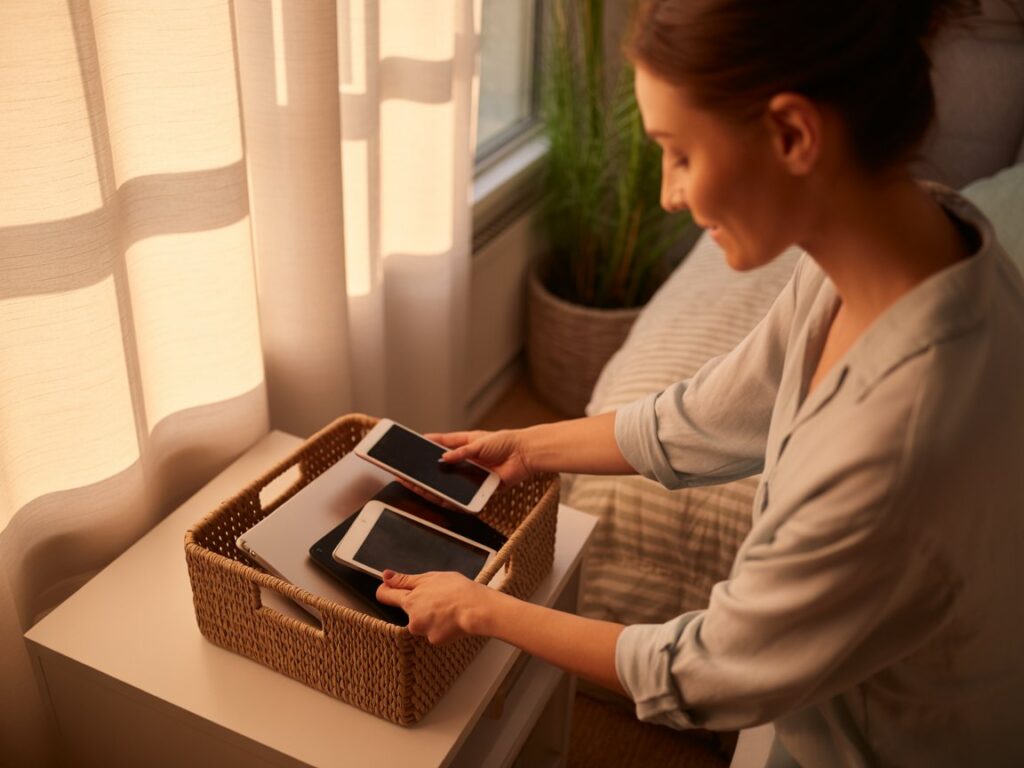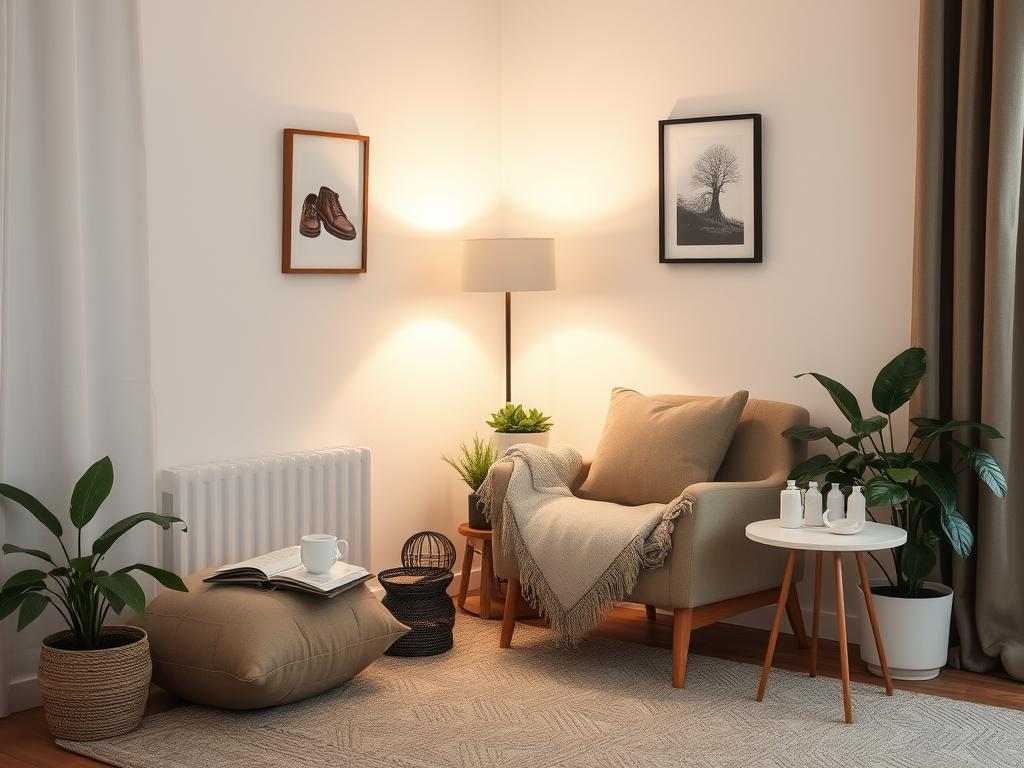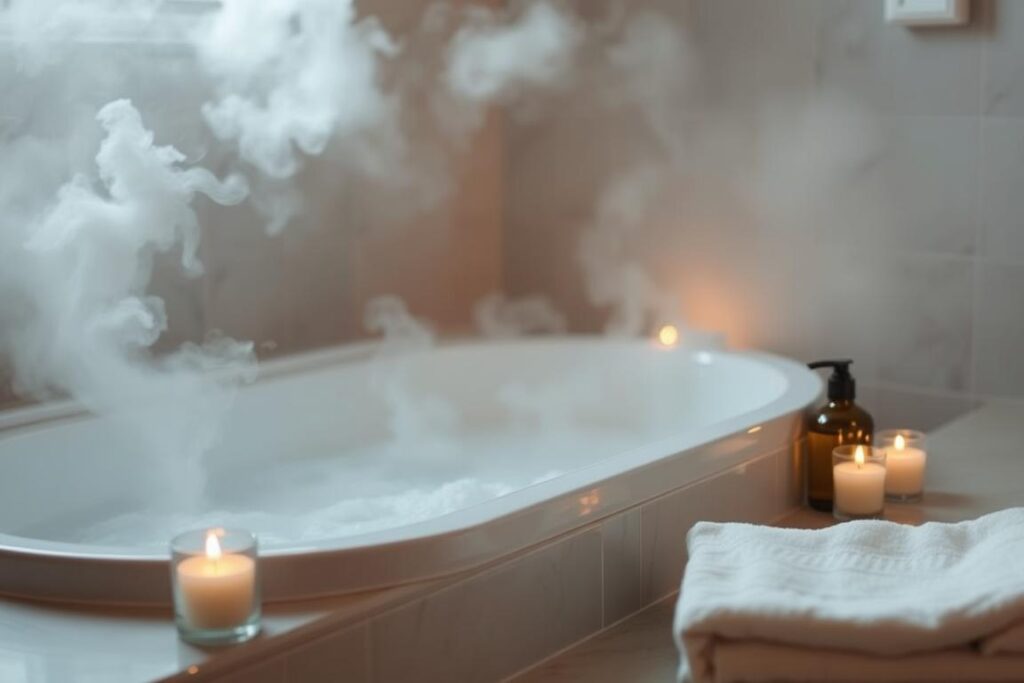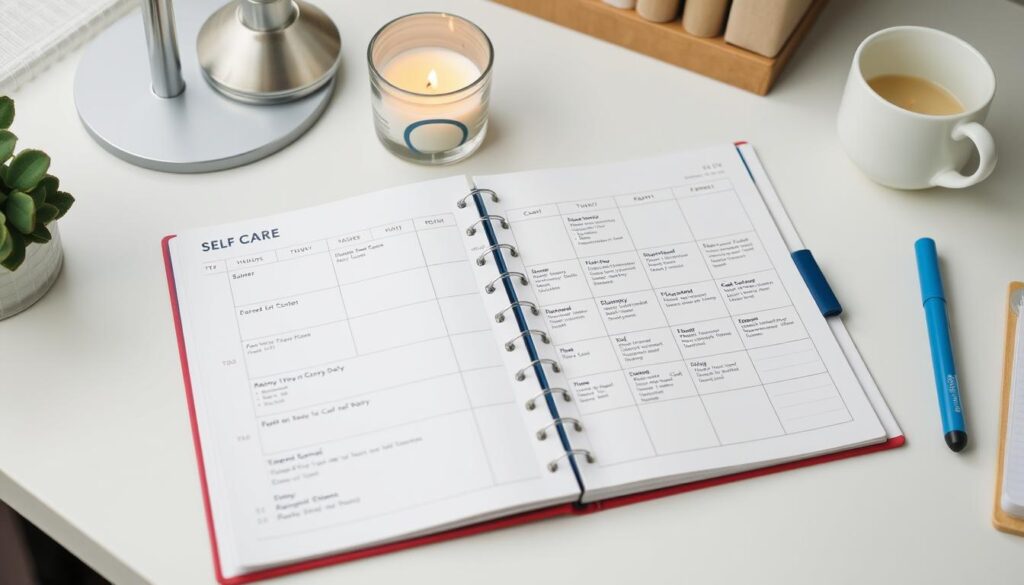The good news? You don’t need elaborate spa treatments or hours of free time to practice meaningful self-care. Even small, consistent actions can make a significant difference in your stress levels and overall wellbeing. Let’s explore eight practical self-care routines that can help you transition from work stress to evening calm.
1. Change Your Environment
One of the most effective ways to signal to your brain that work time is over is by intentionally changing your physical environment. This practice is especially important for remote workers who may not have the natural transition that comes with leaving an office building.
Why it works for stress relief:
Creating a clear physical boundary between work and personal time helps your mind make the same distinction. Environmental cues can trigger your nervous system to shift from an alert, productive state to a more relaxed one, allowing stress hormones to naturally decrease.
How to implement this practice:
- Change out of work clothes into something comfortable as soon as your workday ends
- Light a candle with a calming scent like lavender or vanilla
- Open windows to let in fresh air, creating literal and symbolic “breathing room”
- Adjust lighting to a warmer, softer glow that signals relaxation time
- Put away work-related items like laptops or notebooks, or close your home office door if you have one
Even if you work from home, these simple environmental shifts can create a psychological boundary that helps you mentally clock out and transition to personal time. The ritual itself becomes a mindful moment that helps you release work-related thoughts.

2. Move Your Body
After hours of sitting at a desk or being in the same position, gentle movement can help release physical tension that accumulates during the workday. Movement also helps process stress hormones that may have built up in your system.
Why it works for stress relief:
Physical activity releases endorphins, your body’s natural mood elevators. Even light movement increases circulation, which helps flush stress hormones from your system. The mind-body connection means that releasing physical tension often leads to mental relaxation as well.
How to implement this practice:
- Take a 15-minute walk around your neighborhood to create a buffer between work and home life
- Do 10 minutes of gentle stretching, focusing on areas that hold tension like your neck, shoulders, and back
- Try a short yoga sequence designed specifically for stress relief
- Dance to a few of your favorite songs in your living room
- If you have stairs in your home, walk up and down them a few times to get your blood flowing
Remember that this movement isn’t about fitness goals or intense exercise—it’s about gently releasing tension and signaling to your body that it’s time to transition. Even five minutes of intentional movement can make a noticeable difference in how you feel.

3. Take a Tech Timeout
The constant pings, notifications, and blue light from our devices can keep our nervous systems in an activated state, making it difficult to truly unwind after work. Creating intentional space away from screens gives your mind a chance to reset.
Why it works for stress relief:
Digital devices emit blue light that can suppress melatonin production, making it harder to relax and eventually sleep. Additionally, the constant stream of information keeps your brain in an alert, processing mode rather than allowing it to wind down. Taking a break from this stimulation helps your mind naturally calm.
How to implement this practice:
- Set a specific time to put away work devices—and stick to it
- Create a “phone basket” where all family members place their devices during dinner or evening hours
- Use a timer to take a 30-60 minute break from all screens
- Enable “do not disturb” mode on your devices during your unwinding time
- If you need to use devices in the evening, install a blue light filter app that activates automatically
If completely disconnecting feels challenging, start with small increments of time and gradually increase. You might be surprised by how quickly your mind adapts to—and appreciates—these screen-free periods.

4. Prepare a Nourishing Meal
The act of preparing and enjoying food can be a meditative practice that helps you transition from work mode to relaxation. Nourishing your body with a satisfying meal also provides the energy and nutrients needed to recover from a stressful day.
Why it works for stress relief:
Cooking engages your senses and requires presence, naturally pulling your attention away from work concerns. The repetitive actions of chopping, stirring, and measuring can be meditative. Additionally, certain foods contain nutrients that help regulate stress hormones and support your nervous system.
How to implement this practice:
- Keep a few simple, nourishing recipes on hand that you can prepare in 30 minutes or less
- Prep ingredients on weekends to make weeknight cooking easier
- Focus on including stress-reducing foods like leafy greens, fatty fish, nuts, and whole grains
- Make the process enjoyable by playing music or a podcast while you cook
- Eat mindfully at a table without distractions, savoring each bite
If cooking feels like another chore after a long day, simplify your approach. A nourishing meal doesn’t have to be elaborate—even assembling a simple bowl with pre-cooked grains, protein, and vegetables can be satisfying and stress-relieving.

5. Journal or Brain Dump
When work thoughts continue to circulate in your mind after hours, transferring them to paper can help create mental space and closure. This practice helps you process the day and clear your mind for evening relaxation.
Why it works for stress relief:
Writing externalizes your thoughts, giving your brain permission to let go of them temporarily. This process helps create cognitive closure on work matters and reduces the mental load you’re carrying. Research shows that expressive writing can reduce stress hormones and improve mood.
How to implement this practice:
- Keep a dedicated “work thoughts” notebook where you can jot down anything that’s still on your mind
- Set a timer for 10 minutes and write continuously without editing or judging what comes up
- Create a “done list” rather than just focusing on what’s still pending
- Write down three things that went well during your workday
- If you’re worried about tomorrow, make a brief plan so your brain knows those items are accounted for
This practice doesn’t need to be elaborate or time-consuming. Even a quick five-minute brain dump can help create mental space between work time and personal time, allowing you to be more present in your evening.

6. Create a Calm Zone
Having a dedicated space for relaxation gives you a physical location to retreat to after work. This space becomes associated with calm, making it easier to shift into a relaxed state when you enter it.
Why it works for stress relief:
Environmental psychology shows that we develop associations with different spaces. By creating and consistently using a dedicated relaxation area, your brain begins to associate that space with calm, triggering your parasympathetic nervous system (rest and digest mode) when you enter it.
How to implement this practice:
- Designate a specific chair, corner, or area of your home as your relaxation space
- Add sensory elements that promote calm, such as soft textures, pleasant scents, or gentle sounds
- Keep this area free from work-related items and activities
- Include items that support relaxation, like books, a cozy blanket, or a meditation cushion
- Use this space consistently for unwinding activities to strengthen the association
Your calm zone doesn’t need to be large or elaborate. Even a single comfortable chair in a corner with good lighting and a few personal touches can become a powerful tool for transitioning from work stress to evening relaxation.

7. Take a Warm Shower or Bath
Water therapy has been used for centuries to promote relaxation and healing. The simple act of washing away the day can be both literally and symbolically cleansing, helping you transition from work mode to relaxation.
Why it works for stress relief:
Warm water helps relax tense muscles and improves circulation. The sensory experience of water on your skin can also ground you in the present moment, interrupting stress-inducing thought patterns. Additionally, the ritual aspect of bathing creates a clear boundary between work time and personal time.
How to implement this practice:
- Take a warm shower immediately after work to “wash away” the day’s stress
- Add Epsom salts to a bath to help relieve muscle tension (the magnesium is absorbed through your skin)
- Use calming essential oils like lavender or eucalyptus to enhance relaxation
- Practice mindfulness by focusing on the sensations of water, temperature, and scent
- Keep the experience screen-free to maximize its calming benefits
Even a quick five-minute shower with intention can serve as an effective reset button after work. The key is to approach it as a mindful practice rather than just another task to complete.

8. Do a Mini Wind-Down Ritual
Creating a consistent evening ritual helps your brain recognize that it’s time to shift gears. This doesn’t need to be elaborate—even a simple 15-minute sequence can effectively signal the transition from work mode to relaxation.
Why it works for stress relief:
Rituals provide predictability and structure, which can be calming to your nervous system. By consistently pairing certain activities together, you create a conditioned response where the beginning of your ritual automatically starts to trigger relaxation. This makes unwinding more automatic and less effortful over time.
How to implement this practice:
- Choose 2-3 calming activities that you enjoy and can do consistently
- Perform these activities in the same sequence each evening
- Keep the ritual reasonable in length—15-30 minutes is often enough
- Consider including a cup of herbal tea paired with reading, gentle stretching, or listening to calming music
- Avoid introducing stimulating elements like news, work emails, or intense conversations
The power of this practice comes from consistency rather than complexity. A simple ritual done regularly will be more effective than an elaborate one you rarely complete. Find what feels nourishing and sustainable for your lifestyle.

Tips for Making Self-Care After Work a Consistent Practice
Knowing what to do for self-care is one thing—actually doing it consistently is another. Here are some practical strategies to help you maintain your self-care routines even during busy periods:
Start Small and Build
Begin with just one 5-minute practice rather than trying to implement multiple routines at once. Once that becomes habitual, gradually add more elements or extend the time. Small, consistent actions are more sustainable than occasional elaborate self-care sessions.
Schedule It
Block out time for self-care on your calendar just as you would an important meeting. Having a designated time helps prevent work from expanding to fill your entire evening. Even 15-30 minutes of intentional unwinding time can make a significant difference.
Create Environmental Triggers
Set up visual reminders or environmental cues that prompt your self-care routine. This might be placing your journal on your coffee table, setting out your comfortable clothes before work, or having a dedicated “unwinding” playlist ready to go.
Practice Self-Compassion
There will be days when your self-care routine doesn’t happen as planned. Instead of self-criticism, approach these moments with kindness and simply begin again the next day. Remember that self-care is a practice, not a performance.
Track Your Results
Notice how you feel on days when you practice self-care versus days when you don’t. This awareness can help motivate consistency when you recognize the tangible benefits to your mood, sleep quality, and overall wellbeing.
Adjust as Needed
Your self-care needs may change depending on the season, your work demands, or your energy levels. Be willing to adapt your routines while maintaining the core commitment to creating space between work and personal time.

Overcoming Common Obstacles to Self-Care After Work
“I don’t have enough time for self-care after work.”
This is perhaps the most common obstacle. Remember that effective self-care doesn’t require hours—even 5-10 minutes can make a difference. Look for small pockets of time that might be currently filled with mindless scrolling or other low-value activities. Consider waking up 15 minutes earlier or using part of your lunch break for a brief self-care practice.
“I feel guilty taking time for myself when I have other responsibilities.”
Remember that self-care isn’t selfish—it’s necessary maintenance that allows you to show up more fully in all areas of your life. Just as airlines instruct you to put on your own oxygen mask before helping others, taking care of your wellbeing enables you to better care for those around you. Small acts of self-care can actually make you more present and effective in your other responsibilities.
“I’m too exhausted after work to do anything but collapse.”
If you’re consistently depleted after work, passive self-care activities might be more appropriate than active ones. Try gentle practices like taking a warm shower, listening to calming music, or simply sitting quietly for a few minutes. Over time, these restorative practices may help increase your energy levels. Also consider whether there are aspects of your work situation that need addressing if extreme fatigue is a regular occurrence.
“Work emergencies often interrupt my evening plans.”
If your job regularly requires after-hours attention, try creating clearer boundaries where possible. This might mean designating specific times when you’ll check work communications in the evening, rather than remaining constantly available. For unavoidable work emergencies, have a “mini reset” practice ready—perhaps three deep breaths or a quick stretch—that you can use to transition back to personal time afterward.

The Ripple Effects of Regular Self-Care After Work
Consistent self-care practices don’t just improve your evenings—they can have far-reaching benefits for your overall wellbeing and quality of life. Here are some of the positive changes you might notice when you regularly create space to unwind after work:
Improved Sleep Quality
By giving your mind and body time to wind down before bed, you’re likely to fall asleep more easily and experience deeper, more restorative sleep. This creates a positive cycle, as better sleep leads to better stress management the following day.
Enhanced Relationships
When you’ve taken time to process work stress and reset, you can be more present and patient with loved ones. This leads to more meaningful connections and fewer stress-induced conflicts at home.
Increased Creativity
Allowing your mind to rest and wander during downtime often leads to new insights and creative solutions—even to work problems. Some of your best ideas may come during or after self-care practices.
Greater Work Satisfaction
Creating healthy boundaries between work and personal life can actually increase your job satisfaction. You’ll likely return to work more refreshed and engaged when you’ve had proper time to recharge.
Improved Physical Health
Chronic stress takes a toll on your body. Regular self-care practices help regulate stress hormones, potentially reducing inflammation and strengthening your immune system over time.
Increased Self-Awareness
Taking time to check in with yourself regularly builds your capacity to recognize your needs and respond appropriately, rather than pushing through to the point of burnout.

Finding Your Personal Self-Care Rhythm
Self-care isn’t one-size-fits-all. The practices that help you unwind might be different from what works for someone else. Pay attention to which activities genuinely help you feel more relaxed and present, and build your routine around those.
Remember that self-care after work isn’t a luxury or an indulgence—it’s an essential practice that helps you maintain balance and wellbeing in a busy world. By creating intentional transitions between your professional and personal life, you reclaim your evenings and create space for rest, connection, and activities that bring you joy.
The key is consistency rather than perfection. Even small moments of intentional unwinding, practiced regularly, can significantly reduce your stress levels and improve your quality of life over time.
Start Your Self-Care Journey Tonight
You deserve to feel grounded, even on the busiest days. Try just one of these self-care rituals tonight and see how it transforms your evening.


